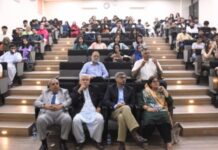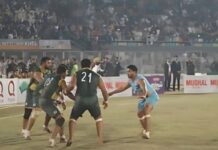ISLAMABAD (NNI): The Election Commission of Pakistan (ECP) legal team has advised to restore the lawmakers who were suspended after the Supreme Court landmark verdict on the reserved seats.
According to sources, the ECP meeting headed by Chief Election Commissioner Sikandar Sultan Raja concluded, with legal team advising the commission to implement its decision after the election act as every institution is bound to do so.
Sources revealed that the legal team told ECP after the election act amendment the Supreme Court reserved seats verdict stands ineffective hereby the suspended lawmakers shall be restored.
Earlier, the ECP moved the Supreme Court of Pakistan, to seek guidance on the allocation of reserved seats to the PTI.
The ECP filed a review petition in the top court, challenging the clarification of majority of SC judges on the reserved seats verdict issued on September 14.
The ECP noted that ECP is not responsible for delaying the verdict by the SC as it challenged the July 12 verdict on July 25 but the clarification was issued on September 14.
The commission also stated in its review plea that neither PTI, nor the electoral body was issued notices regarding the relevant documents of the PTI.
A 13-member bench of the top court, headed by Chief Justice Qazi Faez Isa, ruled that the PTI is eligible for the allocation of reserved seats, dealing a major setback to Prime Minister Shehbaz Sharif’s ruling coalition.
Justice Mansoor Ali Shah announced the 8-5 majority verdict, setting aside the Peshawar High Court’s (PHC) order wherein it had upheld the Election Commission of Pakistan’s (ECP) decision denying the reserved seats to the SIC.
Chief Justice of Pakistan (CJP) Qazi Faez Isa, Justice Jamal Mandokhail, Justice Naeem Afghan, Justice Yahya Afridi, and Justice Ameenuddin Khan opposed the majority decision.
The reserved seats issue came to limelight after over 80 Pakistan Tehreek-e-Insaf (PTI) backed independent candidates emerged victorious in the February 8 elections.
The SIC then approached the ECP on February 21 seeking allocation of reserved seats.
However, the PTI suffered a setback after the electoral body, citing the party’s failure to submit its list of candidates, denied allocating the reserved seats to the SIC via its 4-1 majority verdict on March 4.
The election commission distributed the reserved seats for women and minorities among other political parties.
The PTI-backed SIC had approached the court after the ECP refused to allocate the reserved seats due to the party’s failure to submit its list of candidates before the deadline. The Peshawar High Court (PHC) upheld the ECP’s decision, leading the SIC to appeal to the Supreme Court.
In the Khyber Pakhtunkhwa Assembly – according to a notification, the ECP allocated one reserved seat each to Jamiat Ulema-i-Islam Pakistan, Pakistan Muslim League-Nawaz (PML-N) and Pakistan People’s Party (PPP).
In Sindh Assembly – allocated reserved seat for women to Muttahida Qaumi Movement-Pakistan (MQM-P) and PPP. PPP’s Samita Afzal and MQM-P’s Fouzia Hameed elected on reserved seats.
Subsequently, the PHC ruling allowed the ruling coalition, comprising the Pakistan Muslim League-Nawaz (PML-N), Pakistan Peoples Party (PPP), and other allies, to gain a two-thirds majority in the National Assembly. This decision increased the PML-N’s seats to 123 and the PPP’s to 73, while the SIC held 82 seats. NNI








































